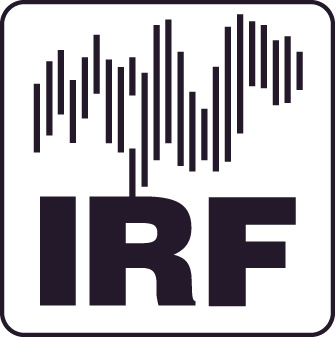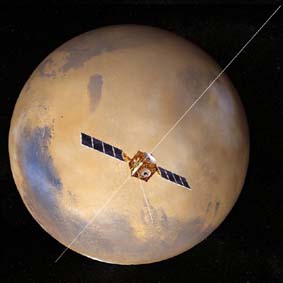

|
| Overview |
| Topical |
| Popular Science |
| Research |
| Observatory |
| Data |
| SEARCH |
| |
| IRF Kiruna |
| IRF Umeå |
| IRF Uppsala |
| IRF Lund |
|
MAP 
|
|
|


Mars Express satellite (Picture: ESA)
Mars Express is the first European mission to Mars. It
was launched on a Soyuz-Fregat rocket from Baikonur in
Kazakhstan on 2 June 2003 at 19.45 CEST (Central European
Summer Time). The spacecraft was injected into an
elliptical polar orbit around Mars at Christmas 2003. The
Swedish Institute of Space Physics (IRF) has provided one of
the 7 instruments on the spacecraft. IRF's
instrument ASPERA-3 studies how the solar wind affects
the Martian upper atmosphere. ASPERA-3 comprises five
sensors to measure electrons, ions, and energetic neutral
atoms (ENA). ASPERA-3 has performed the first-ever ENA
measurements at another planet in the low energy range (100
eV-10 keV). ASPERA-3 (Analyser of Space Plasmas and Energetic Atoms) is made up of two components:
* the Main Unit, comprising the mechanical scanner, digital processing unit (DPU), Neutral Particle Imager (NPI), Neutral Particle Detector (NPD) and Electron Spectrometer (ELS), and
* the Ion Mass Analyser (IMA), mounted separately.
|
Launched: |
2 June 2003, 19.45 CEST |
|
Destination: |
Mars |
|
IRF instrument: |
ASPERA-3, Energetic Neutral Atoms Analyser (PI: Assoc. Prof. Mats Holmström) |
|
Contact: |
Assoc. Prof. Mats Holmström, Principal Investigator,
mats.holmstrom*irf.se,
tel. +46-980-79186 |
|
Satellite homepage: |
|
|
IRF's ASPERA-3 portal: |
ASPERA-3 - detailed information |